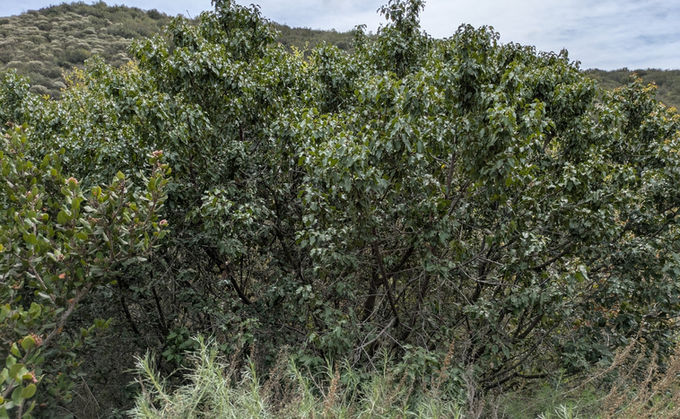We're open for the Season!
Nursery Hours for October-March
Thursday-Saturday: 9:00-5:00 • Wednesday/Sunday: By Appointment
🌲🌲🌲Holiday Schedule🌲🌲🌲
Thanksgiving: Thursday & Friday CLOSED • Saturday OPEN 9:00-5:00
Christmas: 12/23/2025-01/07/2026 CLOSED
Hollyleaf Cherry
Prunus ilicifolia ssp illcifolia
true
1 gallon; 3 gallon
Hollyleaf Cherry
In stock
5-40'x5-20'
Sizes:
Hollyleaf Cherry – Prunus ilicifolia subsp. ilicifolia
Also known as: Evergreen Cherry, California Cherry
Hollyleaf Cherry is the most widely distributed subspecies of native cherry in California. It thrives in chaparral, coastal sage scrub, and southern oak woodland habitats. Its size varies greatly depending on conditions: in dry, rocky, or shallow soils, it grows as a dense shrub (5–15 feet tall), while in richer soils it can become a small tree reaching 30–40 feet. The glossy, evergreen leaves resemble holly in shape and texture, lending the plant its common name.
In spring, P. ilicifolia produces long, arching clusters of creamy-white flowers with a soft almond-like fragrance, followed by showy red to black fruit in summer. These cherries are edible when ripe (though mostly skin and seed) and highly attractive to birds and mammals. This species is ideal for erosion control on slopes, habitat restoration, or as a handsome background shrub or informal hedge in native landscapes. It is highly tolerant of heat, drought, and full sun, requiring little water once established.
Wildlife Value
Host Plant: Numerous moth and butterfly species; according to 100 Plants to Feed the Monarch (Xerces Society), Prunus species support over 400 Lepidoptera species, including Pale Swallowtail (Papilio eurymedon); Western Tiger Swallowtail (Papilio rutulus); Holly Blue (Celastrina angialis); California Hairstreak (Satyrium californica); Lorquin’s Admiral (Limenitis lorquini)
Nectar Source: Monarch (Danaus plexippus); Generalist butterflies & insects
Bird Resources: Berries/Fruit; Insects; Nest Sites
Bird Species: California Thrasher (Toxostoma redivivum); American Robin (Turdus migratorius); Western Bluebird (Sialia mexicana); Northern Mockingbird (Mimus polyglottos)
Plant Care
Native region:
Mojave Desert
Water needs:
Low
Exposure:
Full Sun; Filtered Sun
Mature size:
5-40'x5-20'
Growth rate:
Moderate
Flower color:
Cream; White; Purple
Flower season:
Winter; Spring
Pruning:
Can be pruned into a standard tree or sheared into a hedge. Prune in late fall after the fruit is gone.
Cold Hardiness:
15 Degrees
Nectar-producing:
Yes
Attracts pollinators:
Yes
Nighttime pollinators:
No
Butterflies or Moths:
Yes
Monarchs:
Yes
Larval host:
Yes
Bees:
No
Bats:
No
Birds:
Yes
Nest site:
Yes
Nest materials:
No
Rabbit-resistant:
No
Tortoises:
No
Growing Plants in the Desert — Important Information
The information presented here is, to the best of my knowledge, accurate and based on reliable research, personal experience in my own garden, observations from other gardens I’ve visited, and time spent studying plants in their native habitats. I always welcome your feedback and experiences to help me continue educating others!
Cacti:
In my experience, cacti are much happier in filtered shade here in the low desert of the Coachella Valley. Their colors are more vibrant and they tend to bloom more profusely, especially the non-native varieties. If you look closely at how our native barrel cactus and beavertail prickly pear grow in the wild, you’ll often find them tucked among rocks or beneath the shelter of creosote and other shrubs.
⚠️ A note of caution: Cacti and succulents are often illegally collected from the wild, which not only damages plant populations but also disturbs entire ecosystems. In some cases, wild populations of cacti have even gone extinct because of this practice. When purchasing these plants, always be sure they’ve been legally obtained. Look for nursery-grown stock or plants with a native plant certification, and keep that documentation for your records.
Light Requirements:
In our desert (Sonoran/Colorado), “full sun” doesn’t always mean what you might think. Many so-called full-sun plants benefit from and actually appreciate some late-afternoon filtered light—especially during the intense summer months.





